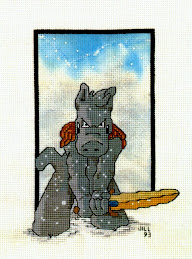
There's been a huge buzz around N.K Jemisin's The Hundred Thousand Kingdoms ever since it was released early in 2010, enough to get it a surprise Hugo nomination for 2011. With all I'd heard about and that entrancing cover I did want to read it.
Having done so I'm not exactly sure why it's so hyped. There's nothing particularly exciting or ground breaking in the book. In fact for it's 300 or so pages largely nothing happens, aside from the Twilightesque love story between passive protagonist Yeine and the dual god aspect Nahadoth (Nahadoth is Edward and Yeine is Bella, if you want to continue the Twilight metaphor poor old T'vril is Jacob).
The story is fairly generic. Naive young girl from the outlying barbarian matriarchal kingdom of Darr gets called to the capital and is proclaimed as heir to the fast fading king. This of course throws Yeine into a deadly game of intrigue with her vicious cousins Scimina and Relad. I'm probably doing Relad a bit of a disservice here, he didn't seem like that bad a bloke. Scimina was thoroughly hateful and at times I wished the book was about her, she seemed a lot more interesting than Yeine. Yeine has nothing at all to fight with and her cousins have gods as their playthings. One of things that really bothered me about the book was that there was never any clear reason as to exactly why beings with godlike power allowed themselves to be enslaved and tortured by the highbloods. There was some confusing claptrap about one of the higher gods; Itempas, having defeated Nahadoth and Co, but it didn't fly for me.
What sets The Hundred Thousand Kingdoms apart from so many other books like it and all the other Twilight wannabes is the writing and the style. Jemisin has a remarkable skill with words and having the story told in first person by Yeine (who Jemisin admits is largely her) is a master stroke. Yeine isn't the most reliable of narrators, but she's stunningly, painfully honest at the same time. The story as told by her skips about here, there and everywhere, it visits past, present and future, not always in that order. Yeine breaks into the chapters to tell little fairy stories about her world and the gods that inhabit it. At times it is frustrating, but for the most part it's fascinating and gives the whole thing a rather dreamlike, poetic quality.
However brilliant the style is it doesn't cover up the very sketchy Eddingsesque wold building. I was never able to get a real sense of the world that Jemisin was trying to create, big on feelings, emotional conflict and love stories, very light on actual detail about surroundings or appearance. There's evidence in the appendices that quite a lot of thought has been put into creating the world, but it doesn't show in the story. Many of the characters are equally as two dimensional and this made it hard for me to connect or sympathise with him. I probably liked the child like god Sieh the most, until he showed his true colours and became truly creepy.
Although The Hundred Thousand Kingdoms is the first book of a trilogy it's fairly self contained and tied up neatly at the end. I liked this, because I don't have any intention of spending any more time in the world or with the characters.





